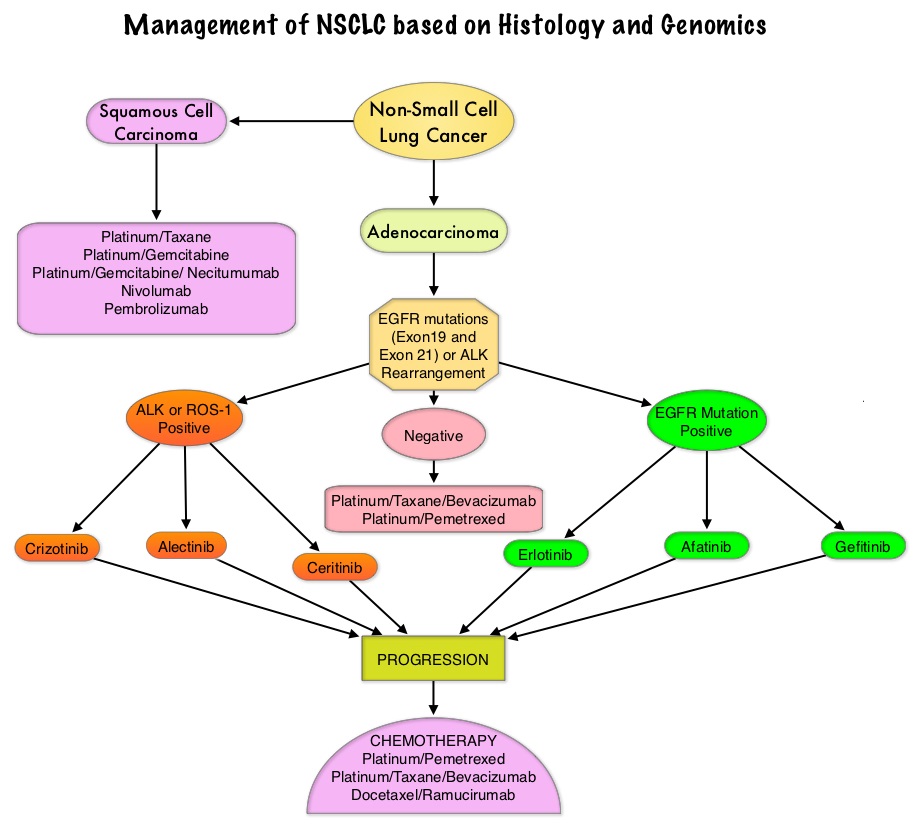SUMMARY: The FDA on March 11, 2016, approved XALKORI® (Crizotinib) for the treatment of patients with metastatic Non Small Cell Lung Cancer (NSCLC), whose tumors are ROS1-positive. XALKORI® was first approved in 2011 for the treatment of patients with NSCLC, whose tumors are Anaplastic Lymphoma Kinase (ALK) positive. Lung cancer is the second most common cancer in both men and women and the American Cancer Society estimates that for 2016, about 224,390 new cases of lung cancer will be diagnosed and over 158,000 patients will die of the disease. Lung cancer is the leading cause of cancer-related mortality in the United States. Non Small Cell Lung Cancer (NSCLC) accounts for approximately 85% of all lung cancers. Of the three main subtypes of Non Small Cell Lung Cancer (NSCLC), 25% are Squamous cell carcinomas, 40% are Adenocarcinomas and 10% are Large cell carcinomas. There is now growing body of evidence suggesting superior outcomes when advanced NSCLC patients with specific genomic alterations receive targeted therapies. Approximately 1-2% of lung adenocarcinomas harbor ROS1 gene rearrangements. ROS1 gene is located on chromosome 6q22 (long arm of chromosome 6) and plays an important role in cell growth and development. ROS1 gene fusion with another gene results in a mutated DNA sequence which then produces an abnormal protein responsible for unregulated cell growth and cancer. ROS1 gene rearrangement has been identified as a driver mutation in Non Small Cell Lung Cancer with adenocarcinoma histology. This is more common in nonsmokers or in light smokers (<10 pack years), who are relatively young (average age of 50 years) and thus share similar characteristics with ALK-positive patients. The ROS protein and the ALK protein have similar structure and function and are sensitive to Tyrosine Kinase Inhibitors such as XALKORI® (Crizotinib) and ZYKADIA® (Ceritinib). ROS1 mutations have been also been associated with Cholangiocarcinoma (Bile duct cancer) and Glioblastoma multiforme. ROS1 rearrangements are mutually exclusive with other oncogenic mutations found in NSCLC such as EGFR mutations, KRAS mutations and ALK rearrangement. The presence of a ROS1 rearrangement can be detected by Fluorescence In Situ Hybridization (FISH), ImmunoHistoChemistry (IHC), Reverse Transcriptase-Polymerase Chain Reaction (RT-PCR) and Next Generation-Sequencing. XALKORI® is a small molecule Tyrosine Kinase Inhibitor that targets ALK, MET and ROS1 tyrosine kinases.
The latest FDA approval was based on the results of a multicenter, single-arm, expansion cohort of the phase I study of XALKORI®, in which 50 patients with advanced NSCLC, who tested positive for ROS1 rearrangement, were enrolled. The median age was 53 years, 98% had adenocarcinoma histology and majority of patients (86%) had received previous treatment for advanced disease, with 44% having received more than 1 prior therapy. XALKORI® was administered orally at 250 mg twice daily in continuous 28-day cycles. Treatment was continued until disease progression or unacceptable toxicities. The primary end point was Objective Response Rate, and Duration of Response (DoR) was an additional outcome measure.
The Objective Response Rate by investigator assessment was 72%, with 3 Complete Responses and 33 Partial Responses. The median Duration of Response was 17.6 months. The median Progression Free Survival was 19.2 months and Overall Survival rate at 12 months was 85%. The most common adverse reactions associated with XALKORI® were vision disorders, nausea, diarrhea, vomiting, edema, elevated transaminases, fatigue, upper respiratory infection and neuropathy.
The authors concluded that XALKORI® has significant antitumor activity in patients with advanced ROS1-rearranged NSCLC. The significantly superior median Duration of Response (17.6 vs 11.4 months) and median Progression Free Survival (19.2 vs 9.7 months) in the ROS1-rearranged NSCLC compared to ALK- rearranged NSCLC, may be due to more potent inhibition of ROS1 than ALK, by XALKORI®, resulting in more effective target inhibition and more durable responses. Crizotinib in ROS1-Rearranged Non–Small-Cell Lung Cancer. Shaw AT, Ou S-HI, Bang Y-J, et al. N Engl J Med 2014; 371:1963-1971

